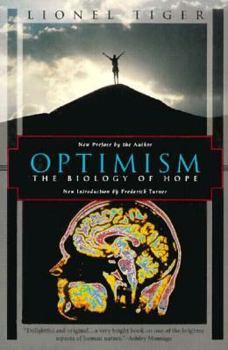Optimism: The Biology of Hope
Select Format
Select Condition 
Book Overview
First published in 1979, Rutgers professor Tiger explores the human trait of believing in hope and improvement. This description may be from another edition of this product.
Format:Paperback
Language:English
ISBN:156836072X
ISBN13:9781568360720
Release Date:January 1995
Publisher:Kodansha
Length:320 Pages
Weight:0.96 lbs.
Dimensions:0.9" x 5.6" x 8.4"
Related Subjects
Psychology Self Help Self-Help Self-Help & Psychology Social Science Social SciencesCustomer Reviews
1 rating
Optimism the biology of hope BY: Lionel Tiger 1979
Published by Thriftbooks.com User , 15 years ago
The tiger's claws are in repose. Instead of the imperious stance pouncing upon a new truth or asserting the macho dogma of Men in Groups, this new work finds the author in a speculative, thoughtful mood. He argues that here is a force of optimism in humans which has a biological urgency. The force underlies much of human action - bearing children, sowing crops, building monuments, believing in God, falling in love, acting charitably. Optimism is inextricably bound up with the future, and Tiger notes to what extent humans are unique in their awareness of time passing and mortality. These are grand concepts which in some hands might be grandiose, but Tiger displays virtuosity in the breadth and depth of his analogy, example, experiment, and commentary. The discourse ranges from the meaning of Cro-Magnon cave paintings and the Mosaic development of God as unseen and unnamable, to all manner of contemporary observations, whether on the optimism and power-resentments of the Beatles' generation or the apparent abandonment of contraceptives by teenage girls in the present epidemic of illegitimate births. Pleasure, illusion, dreams, and their opposites in depression, pessimism, doom-saying are noted, as Tiger examines how humans have coped and gambled about uncertainty and destiny. The biological necessity of learning and teaching, and the use of symbols - religious, political, or other - Tiger interprets as vital means of uniting individuals who are fundamentally separated by unique genetic and environmental differences. Tiger has dampened his male-dominated hunting-based hypotheses of human evolution. (At least women are credited with equal cerebral skills in reasoning, planning, and future-oriented behavior!) Many of the ideas discussed bear comparison with age-old philosophical theories or more recent psychological or psychoanalytical notions. (One thinks of Freud, of course, but also Balint's Thrills and Regressions.) Altogether a refreshing and stimulating volume presented with becoming style and grace. (Kirkus Reviews) --This text refers to an out of print or unavailable edition of this title.





